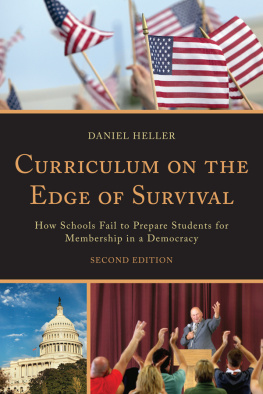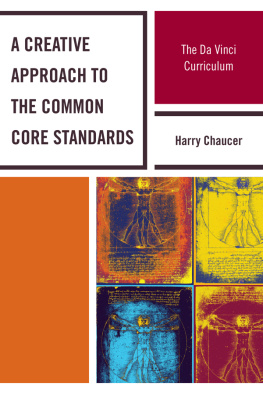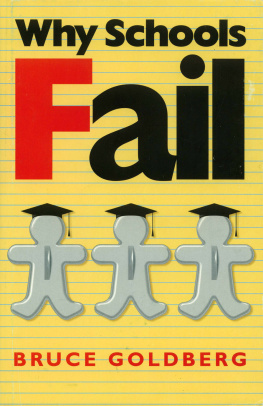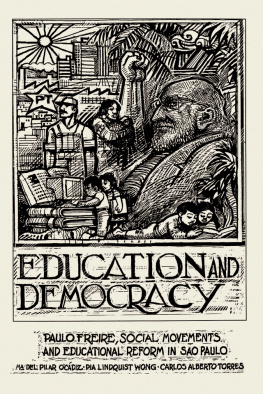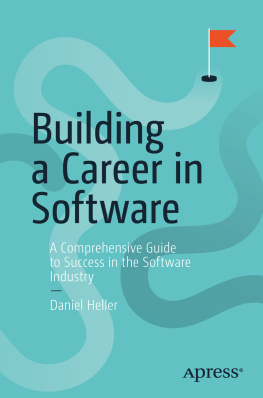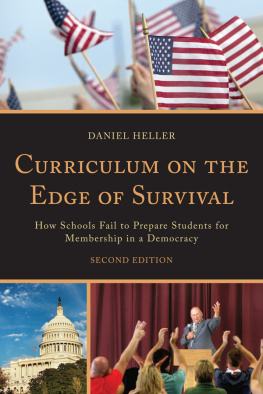Daniel A Heller - Curriculum on the Edge of Survival: How Schools Fail to Prepare Students for Membership in a Democracy
Here you can read online Daniel A Heller - Curriculum on the Edge of Survival: How Schools Fail to Prepare Students for Membership in a Democracy full text of the book (entire story) in english for free. Download pdf and epub, get meaning, cover and reviews about this ebook. genre: Politics. Description of the work, (preface) as well as reviews are available. Best literature library LitArk.com created for fans of good reading and offers a wide selection of genres:
Romance novel
Science fiction
Adventure
Detective
Science
History
Home and family
Prose
Art
Politics
Computer
Non-fiction
Religion
Business
Children
Humor
Choose a favorite category and find really read worthwhile books. Enjoy immersion in the world of imagination, feel the emotions of the characters or learn something new for yourself, make an fascinating discovery.
- Book:Curriculum on the Edge of Survival: How Schools Fail to Prepare Students for Membership in a Democracy
- Author:
- Genre:
- Rating:4 / 5
- Favourites:Add to favourites
- Your mark:
- 80
- 1
- 2
- 3
- 4
- 5
Curriculum on the Edge of Survival: How Schools Fail to Prepare Students for Membership in a Democracy: summary, description and annotation
We offer to read an annotation, description, summary or preface (depends on what the author of the book "Curriculum on the Edge of Survival: How Schools Fail to Prepare Students for Membership in a Democracy" wrote himself). If you haven't found the necessary information about the book — write in the comments, we will try to find it.
Daniel A Heller: author's other books
Who wrote Curriculum on the Edge of Survival: How Schools Fail to Prepare Students for Membership in a Democracy? Find out the surname, the name of the author of the book and a list of all author's works by series.
Curriculum on the Edge of Survival: How Schools Fail to Prepare Students for Membership in a Democracy — read online for free the complete book (whole text) full work
Below is the text of the book, divided by pages. System saving the place of the last page read, allows you to conveniently read the book "Curriculum on the Edge of Survival: How Schools Fail to Prepare Students for Membership in a Democracy" online for free, without having to search again every time where you left off. Put a bookmark, and you can go to the page where you finished reading at any time.
Font size:
Interval:
Bookmark:
Curriculum on the Edge of Survival
How Schools Fail to Prepare Students for Membership in a Democracy
Second Edition
Daniel Heller
Rowman & Littlefield Education
A division of
ROWMAN & LITTLEFIELD PUBLISHERS, INC.
Lanham New York Toronto Plymouth, UK
Published by Rowman & Littlefield Education
A division of Rowman & Littlefield Publishers, Inc.
A wholly owned subsidiary of The Rowman & Littlefield Publishing Group, Inc.
4501 Forbes Boulevard, Suite 200, Lanham, Maryland 20706
http://www.rowmaneducation.com
Estover Road, Plymouth PL6 7PY, United Kingdom
Copyright 2012 by Daniel Heller
All rights reserved . No part of this book may be reproduced in any form or by any electronic or mechanical means, including information storage and retrieval systems, without written permission from the publisher, except by a reviewer who may quote passages in a review.
British Library Cataloguing in Publication Information Available
Library of Congress Cataloging-in-Publication Data
Heller, Daniel A., 1953
Curriculum on the edge of survival : how schools fail to prepare students for membership in a democracy / Daniel Heller.
p. cm.
Includes bibliographical references.
ISBN 978-1-61048-515-9 (cloth : alk. paper)ISBN 978-1-61048-516-6 (pbk. : alk. paper)ISBN 978-1-61048-517-3 (electronic)
1. EducationCurriculaUnited States. 2. Democracy and educationUnited States. I. Title.
LB1570.H438 2011
375.000973dc23
2011048066
 The paper used in this publication meets the minimum requirements of American National Standard for Information SciencesPermanence of Paper for Printed Library Materials, ANSI/NISO Z39.48-1992.
The paper used in this publication meets the minimum requirements of American National Standard for Information SciencesPermanence of Paper for Printed Library Materials, ANSI/NISO Z39.48-1992.
Printed in the United States of America.
To Anthony and Nonno:
The alpha and omega of lifelong learning
Preface TO THE SECOND EDITION
F ive years have passed since the first publication of this book. At that time, I was concerned that Americas public schools had been reduced to preparing students for the workforce and nothing else. I offered the idea that the curriculum should include, as basic components, kindness, thinking, problem-solving, and communication.
These four pillars would not only help to create more open and collaborative learners but also develop the ground of a democratic society. They would allow for the free and open exchange of ideas. They would support understanding and clarity. However, I regret to say that our democracy remains dysfunctional.
The four pillars would never allow for the ideological rigidity which currently defines national politicsthe politics of gridlock. In my conception of democracy, everyone comes to the table to share ideas, and then those ideas are debated until the best solution to the issue emerges. Probably no one gets exactly what he or she wants, but the result is something everyone can live with. The group moves forward.
Now, this does not seem possible. People do not debate; they deliver ideologies at one another. The vituperative and belittling language has all but destroyed the idea of statesmanship. Forget the ability to compromise, which once was a strength and is now seen as weakness. What I argued five years ago is more important now than it was before. We are mired in our own mess.
This new edition contains some expansions of the original. Where there were four teacher narratives, teachers writing about how they incorporated kindness, thinking, problem-solving, and communication into their teaching, there are now eight such accounts. This brings more real and practical voice to these urgent topics.
Each of the five chapters now ends with questions for reflection and discussion. Hopefully, this will make the reader, at least in his or her mind, consider and apply the information. These questions might be the subjects of discussion, further writing, or classroom activity. They would enable the book to fit more easily into a preservice or in-service course on curriculum.
Finally, I have sought more contemporary sources to illustrate and support my claims. In particular, I have cited elements of the new Common Core State Standards.
The new standards are fewer and deeper than most individual state standards. In addition, they emphasize reading nonfiction, creating and understanding sound arguments, and practical application of knowledge and skills. Also, these standards have as goals both college and workplace readiness, thus addressing the academic and vocational needs of our children and country.
The skills to support a democracy do not come automatically. It is little wonder why so many autocratic governments suppress education. Education is the path to success economically and politically. While many people are working to improve the academic results of American education, not enough is being done about laying the political groundwork to make our democracy run as it should.
Once again, the book is a plea to educators, politicians, businesses, and the population in general to address knowledge and the application of knowledge in the context of a democratic society. The underpinnings of our great nation depend on this function of the public schools.
Daniel Heller
Brattleboro, Vermont
September 19, 2011
Acknowledgments
F irst, I would like to thank the editors at Rowman and Littlefield, in particular Tom Koerner, for seeing the merit in my work and agreeing to its publication. I cannot thank enough the eight colleagues who consented to contribute their thoughts and words to the book: Stephanie Aldrich, Gary Blomgren, Alice Carrier, Belle Coles, Sue Dana, Zeke Hecker, Stephen Rice, and Angela Yakovleff. Numerous individuals read and commented upon the manuscript, providing me with useful insights and criticismthank you Joan Burkhard, Loren Clews, Dr. Rosetta Cohen, Dr. Susan Dreyer Leon, Dr. Sam Intrator, Beth Keplinger, Robert Kramsky, KD Maynard, Casey Murrow, Sandy Pentak, Dr. Carol Rodgers, and Tara Toolan. As ever, I appreciate the love and support of my beautiful children: son Benjamin, daughter-in-law Pam, grandson Anthony, and granddaughter Namaiah. They give me inspiration. Finally, I would probably get nothing done without the love of my life, my greatest supporter, and my personal bodhisattva: Nina.
Introduction
A t first glance, school curriculum may appear to be a simple concept. Teach the kids how to read and write, perform mathematics and science, and know some history. Basically, help the students to learn the facts and processes that are necessary to function in life, stick to the basics, and avoid anything too fancy until learners have mastered this basic information and begin specialized training in vocational or postsecondary academic situations.
However, one may look at curriculum from a number of angles and through a number of lenses, and these points of view generally have the effect of determining the purpose of school. Depending on what group has the power to control the purpose of the educational system, one encounters different emphases, values, and pedagogies.
Typically, and the trend for at least the last two decades, this has been to see school curriculum through the lens of preparation for the workplace or higher education. These are both worthy objectives. We want each generation to have the skills and knowledge to be productive, contributing members of society. David J. Hoff, in an article about major business organizations backing of the No Child Left Behind Act (NCLBA) goals, says that All of those efforts have one goal in common: to make American workers of the future economically competitive (Hoff 2006, 24).
This is not the only lens, though, and perhaps not even the most powerful one to use if the goal is to optimize the educational system. The new Common Core goals of workplace readiness or college preparedness again echo the typical view of the purpose of education. But is there more?
Font size:
Interval:
Bookmark:
Similar books «Curriculum on the Edge of Survival: How Schools Fail to Prepare Students for Membership in a Democracy»
Look at similar books to Curriculum on the Edge of Survival: How Schools Fail to Prepare Students for Membership in a Democracy. We have selected literature similar in name and meaning in the hope of providing readers with more options to find new, interesting, not yet read works.
Discussion, reviews of the book Curriculum on the Edge of Survival: How Schools Fail to Prepare Students for Membership in a Democracy and just readers' own opinions. Leave your comments, write what you think about the work, its meaning or the main characters. Specify what exactly you liked and what you didn't like, and why you think so.

